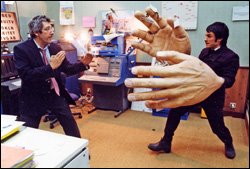 The Science of Sleep (La Science des reves)
The Science of Sleep (La Science des reves)Starring: Gael Garcia Bernal, Charlotte Gainsbourg, Alain Chabat
Written and directed by: Michel Gondry
Official Website
I have no idea what happened in The Science of Sleep.
I've been staring at my computer screen for 20 minutes now, trying to come up with a coherent statement about this film, and drawing a complete and utter blank. My review, I think, can't be coherent because the movie itself isn't coherent at all. Departing from the usual narrative and plotlines, Gondry decided to rock it French New Wave style, with strange and fragmented events, a distorted sense of time and complex webs of dialogue. It's a frustrating movie to watch, indeed- one after which you leave the theater quietly, your mind positively buzzing as it tries to understand what it just saw.
It's also a fascinating, colorful work of art, one which stays with you long after you brain has abandoned its struggle for basic comprehension.
It tells the story of Stephane (Bernal,) a creative young man who was raised in Mexico but has agreed to come to France after his father's death to reconnect with his mother. He obtains a soul-killing job at a calendar design office and becomes infatuated with his next-door neighbor Stephanie (Gainsbourg.) Unfortunately Stephane's highly artistic mind also has trouble deciphering dreams from reality- sometimes he's dreaming when he thinks he's awake, and sometimes he's awake when he thinks he's dreaming. He becomes more and more confused as to what is truth and what is fantasy, risking his job and his relationships as time goes on. Bernal, a rising star for the past few years since his provocative role in Y Tu Mama Tambien, is astounding to watch. He shares both the restful, calm state of dreaming as well as the frenetic pace and sudden sense of panic of a nightmare. He also is able to exude a painful vulnerability, without losing the fact that as wonderful as Stephane may be, he can also be kind of a jerk. His addled mind hurts not just himself but those around him, and neither Bernal nor Gondry shy away from that.
We are, in a sense, meant to be just as confused as Stephane, and everything in the film serves to disorient. The dialogue shifts between English, French and Spanish, causing confusion and mixed messages. It's filled with glorious dream sequences of stop-motion animation, with cellophane clouds that float in the sky, and whole cities made from clay, cardboard and papier-mache. Stephane's dreams, which start out as fantastic, grandiose illusions, begin to look more and more like his waking life. And since we are watching through Stephane's eyes, all of the people in his life, from his love Stephanie to his mother to his horny co-worker Guy become skewed and fractured, until even we don't know what is reality and what is simply Stephane's reality. It's an astute exercise in subjectivity and although the banal meaning of "what happened" in the film becomes lost, the larger meaning of how our perception dictates our experience becomes much clearer.
It's also simply a love story, lovingly rendered and melancholy. I don't know what girl broke Michel Gondry's heart, but he understands unsure, tumultuous love better than anyone I know. It has an ambiguous ending, and an unsatisfying one in many ways, but one that's true to our reality. In our world, Gondry seems to say, nothing is certain. Only in dreams is the happy ending guaranteed.

1 comment:
I really enjoyed this and I had the same sort of feeling of confusion whatching the film but I left completely satisfied. Not too shabby considering that I wasn't a huge of of "Eternal Sunshine..." and was expecting the same sort of zanyness. It's even zanier but I also enjoyed it a lot more.
Post a Comment